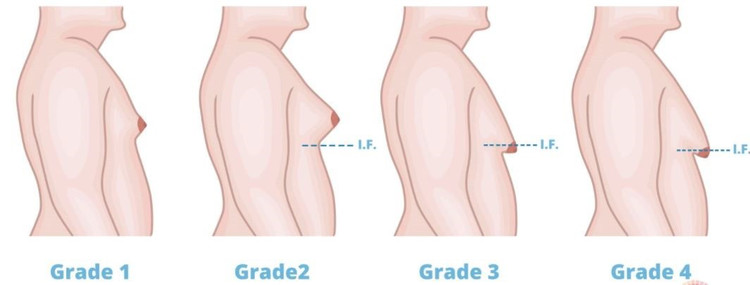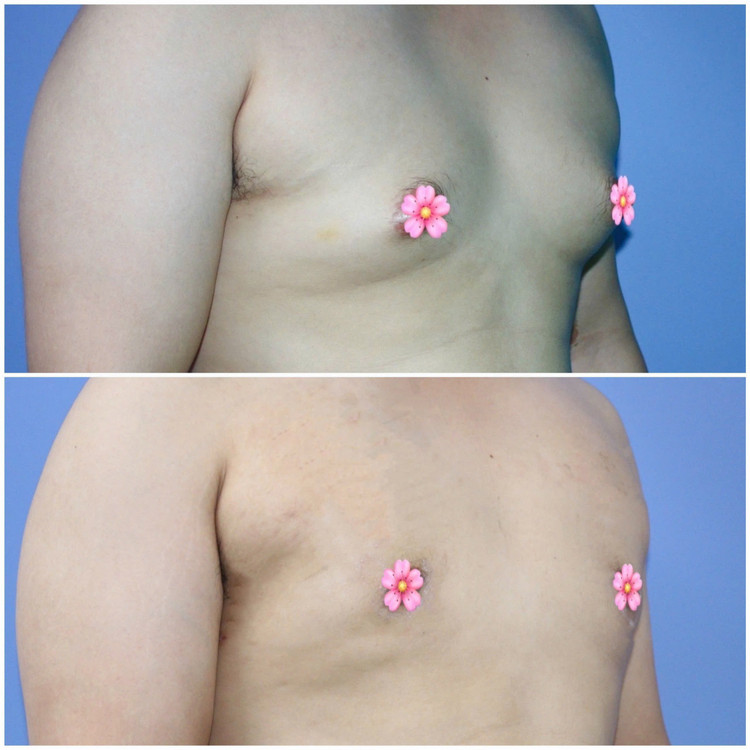Gynecomastia in men is a common disease that not only affects appearance and psychology but also poses many health risks, even male breast cancer, something that is thought to only happen in women.
When men have breasts like women…
MSc. Dr. Ta Thi Hong Thuy, Deputy Head of the Department of Plastic Surgery, Bach Mai Hospital, said that gynecomastia in men is a phenomenon of abnormal development of the mammary glands in one or both breasts.
This condition can occur at all stages of male development and at any age: infants, adolescents, middle-aged adults and even the elderly.
According to experts, up to 50 - 70% of men have obvious signs of breast enlargement. Notably, many patients describe a feeling of severe pain in the breast, similar to the symptoms of women during their menstrual cycle. This makes many people confused, embarrassed and silently endure.
The cause of gynecomastia in men is due to hormonal imbalance, increased estrogen and decreased androgen or deficiency of androgen receptors in the body. The disease can disappear or be reduced by itself if the hormone is stable, however most cases require medication or surgery.
Based on the morphological characteristics of the mammary gland on ultrasound, Rohrich's classification: Grade 1: Minimal hypertrophy <250g, no ptosis; Grade 2: Moderate hypertrophy 250-500g, no ptosis; Grade 3: Severe hypertrophy >500g, ptosis grade 1; Grade 4: Severe hypertrophy with ptosis grade 2 or 3.

According to MSc. Dr. Ta Thi Hong Thuy, gynecomastia in men can appear transiently at birth. This process may be due to increased circulation of estrogen in the mother. After birth, estrogen levels decrease and gynecomastia usually disappears.
The disease is present in nearly 66% of adolescent boys due to an imbalance of estradiol and testosterone. The incidence of gynecomastia increases in older men (over 65 years of age) due to a decline in testosterone and changes in the ratio of testosterone and estrogen.
Some medications such as antidepressants, cardiovascular drugs, hormone drugs..., and underlying diseases: adrenal disease, liver disease, pituitary tumors, thyroid disease and kidney failure can also be causes of this disease.
In particular, tumors of the adrenal glands, pituitary gland, lungs and testicles can disrupt the endocrine system and result in gynecomastia.
More worryingly, gynecomastia is sometimes a warning sign of breast cancer in men (although rare), accounting for 1%, but for people with Klinefelter syndrome, the risk of breast cancer is 60 times higher than normal people.
Don't try to endure it, need to recognize and treat it properly
Physically, gynecomastia causes swelling, pain, breast sensitivity, and body imbalance. But psychologically, many men become self-conscious, afraid to communicate, limit sports activities, and even become depressed.
For all male patients with abnormal breast development, early examination is necessary. Detection of the disease is not too difficult. Just need clinical examination and ultrasound, mammography, hormone testing, biopsy in case of tumor, assessment of associated diseases...

Depending on the cause and severity, the doctor may recommend a variety of non-surgical or surgical treatments. Exercise and diet: Effective in cases of obesity and metabolic disorders; Hormone balancing drugs: For patients with hormonal disorders; Gynecomastia corsets: Temporary cosmetic support in mild cases;
Surgery is the last but definitive option, removing the mammary glands and fatty tissue and reshaping the breasts. The surgical technique depends on the degree of hypertrophy and sagging, with delicate incisions to avoid unsightly scars.
“To reduce the risk of gynecomastia, men should control their weight and exercise regularly. Avoid indiscriminate use of drugs, especially steroids or muscle-building hormones. Get regular health check-ups, especially if there are any unusual signs in the chest. Tell your doctor if you have symptoms of enlarged, painful, or discharging breasts — even if it’s just one side.
Gynecomastia in men is not something to be ashamed of, nor should it be hidden. It is a condition that needs to be recognized correctly and intervened promptly to help patients regain confidence, health and true self", advised MSc. Dr. Ta Thi Hong Thuy.
Source: https://khoahocdoisong.vn/50-70-nam-gioi-co-dau-hieu-vu-to-cho-nen-chu-quan-post1553765.html



































































































Comment (0)